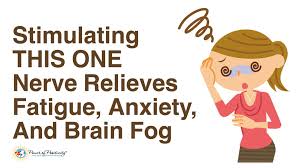
Do you think of your brain as being separate from your body?
A lot of people do.
The reality is that our brains and bodies are intimately and intricately connected.
And the vagus nerve plays an essential roll in tying them together.
The vagus nerve (which is actually a pair of nerves) extends from both sides of the brain stem down through the neck, innervating the heart, lungs, esophagus, and digestive tract.

These nerves are responsible for the deep emotional connection that explains why you have butterflies in your belly when you’re nervous, why your digestion speeds up or slows down when you are under stress, and why some people faint at the sight of blood.
The Vagus nerve, also called “The Wanderer” in Ayurveda, is part of the autonomic (think “automatic”) side of your nervous system. That means you don’t control this nerve the way you do your motor nerves – the vagus signals your digestion to move without you having to think about it, unlike for example when you choose you reach out your arm and pick up a cup of coffee.
And the Vagus controls your relaxation response. It is part of the “parasympathetic” side of your nervous system, which is what I call the “rest, relax, digest and heal” side. This is the counterpart to the “sympathetic” nervous system, which is the “fight or flight” side of the autonomic nervous system.
Because the mind and body are so deeply connected, that is why I don’t view them as separate… and it’s why we I about your stress levels, old trauma, anxiety and mood, and how your relationships are doing. Because I know that the other people in your life (from friends to bosses to partners) are probably determining what you eat, how much you exercise and how stressed you are more than any other factor.
Most people are living their lives in a state of permanent fight or flight due to chronic stress, meaning that as far as their body is concerned they might as well be running from a lion from the moment they wake up to the moment they go to sleep.
Their sympathetic nervous system – fight or flight – is in overdrive and their vagus nerves are basically asleep.
Sound familiar?
If so, you could be sabotaging your digestion and your weight loss goals at the same time. I know this to be true for myself also !!!!
The key to getting past these two connected hurdles isn’t just about food and exercise. It’s also about getting into your head.
THREE COMMON PROBLEMS THAT ALL STEM BACK TO THE VAGUS NERVE:
- Gas bloating, constipation, and IBS. If your belly is a wreck, your brain may be to blame. The vagus is responsible for moving food through the esophagus, stomach and small intestine, as well as the production of essential acids from the stomach and digestive juices from the pancreas. Dysregulated vagal activity has been associated with problems with motility, and the digestion and absorption of food, leading to the overgrowth of bacteria in the digestive tract, which all increases bloating and constipation.
- Overeating. The vagus is responsible for triggering your sensation of fullness, or satiety via a hormone called leptin which is released in the gut as part of digestion and stimulates the vagus. The opposite of leptin, a hormone called ghrelin, stimulates appetite by turning off the vagus nerve.
- Inflammation. Multiple studies have shown that people with higher vagus nerve activity have lower levels of cortisol, our stress hormone, and lower levels of TNF-alpha, an inflammatory immune marker. Studies also show that the vagus nerve regulates inflammation throughout the body, including inflammation associated with obesity, and could be a key modifier of obesity.
How do you stimulate the vagus nerve to work?
Relax.
Sure… easier said than done.
So if finding moments of true relaxation in your life are hard to come by, that could be the key factor that is driving your digestive issues and weight gain.
HOW TO BUILD RELAXATION INTO YOUR LIFE AND SUPPORT THE FUNCTIONING OF YOUR VAGUS NERVE
- Meditation – has been shown to increase vagal activity.
- Sleep – adequate sleep increases vagal tone. If you’re not sleeping, you will need to address this.
- Breathing – a simple breathing exercise in which the exhale is longer than the inhale has been shown to stimulate the vagus. Just breathe in for a count of 4, and out for a count of 6. Repeat for at least 3 minutes.
- Probiotics. Certain strains of probiotics have shown to increase GABA, the relaxation neurotransmitter in the brain, via stimulation of the vagus nerve. You will need help from a health specialists to determine which strains would be best.














Hi Brenda,
You have nailed the connection between our brain and stomuch and the answer to the reason behind butterflies in the stomuch before exams, the diahorea before going to the stage. Breathing could help a lot, I have been practicing present moment awareness through breathing and it works.
Recently, I have become aware of breathing techniques and releasing techniques and yes they do help shift individuals and myself through all of those moments. Thank you for your share and continued success with your breath work!